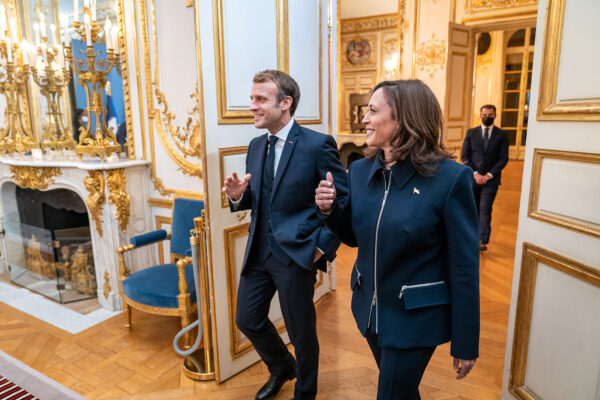
American-French relations have taken a turn for the better. President Joe Biden has invited Emmanuel Macron to a state visit, his first. At a joint news conference with Foreign Minister Catherine Colonna, Secretary of State Antony Blinken said the United States “couldn’t ask for a better partner” than France. Blinken praised the “united and unwavering” allied response to Russia’s war in Ukraine.
Compare the kind words to two decades ago, when American lawmakers were so appalled by French opposition to the Iraq War that they changed the name of French fries in their cafeteria to “freedom fries”.
In part, the restored friendship is a consequence of time having passed and two Atlantic powers remembering their shared interests. But the rapprochement was helped by Russia. Some American and French politicians saw Russia as a useful hedge against the other. They were discredited by Russian aggression against its neighbors and Russian meddling in Western politics.
Ties frayed over Iraq
The French had immediate misgivings about invading Iraq: Jacques Chirac, the French president at the time, warned the pro-American prime minister of the United Kingdom, Tony Blair, that toppling Saddam Hussein might unleash sectarian violence. Blair brushed his concerns aside.
There was also a more fundamental difference of view between Paris and Washington. While the George W. Bush Administration saw France as an impediment in its strategy to defend the liberal world order from a nexus of rogue regimes, terrorism and weapons of mass destruction, the Chirac government saw American unilateralism as the challenge to international law and multilateralism.
Both Bush and Chirac warmed to Russia when the Atlantic alliance frayed. French foreign minister Dominique de Villepin, appearing alongside his Russian counterpart in 2003, outlined a vision of multipolarity in which large states or collections of states would “assume responsibility” for their own region. Translation: less American preponderance in Europe and a freer hand for Russia in its “near abroad.”
Bush’s national security advisor, Condoleezza Rice, advised the president to “punish France, forgive Russia.”
End of the Russian reset
The Iraq rift proved to be the nadir rather than a harbinger of American-French relations.
The post-Iraq presidents, Barack Obama and Nicolas Sarkozy, took steps to shore up the relationship. France returned to full NATO membership. Russia’s invasion of Ukraine, starting in late 2014, definitively convinced Obama that his “reset” with Russia had run its course.
Iraq-era debates over the wisdom of multilateral institutions and sanctions gave way to close American-French cooperation in the G7, NATO and UN on sanctions. Predictions that Western sanctions would lapse as European countries suffered the consequences have not come to pass. In part this can be attributed to French leadership in the EU.
Setbacks for Russia’s friends
Sanctions have imposed a cost on French and American industries, but politicians who argued for conciliation were undermined by Russia itself.
The far-right Marine Le Pen qualified for the crucial second voting round in the last two French elections. Both times she called for weakening or lifting sanctions. In nominal terms, France lost more exports to Russia than most countries. Prohibitions on military sales forced it to cancel the delivery of two state-of-the-art helicopter carriers.
Whatever doubts French voters might have had about the sanctions dissipated when Vladimir Putin dramatically expanded his war in Ukraine in February, just two months before the French voted. Macron accused Le Pen of “complacency” for once arguing Putin could be reasoned with and reminded voters that her party had taken a loan from a Russian state bank. Le Pen condemned the invasion of Ukraine, but it was too little, too late.
Donald Trump’s soft spot for Putin, his ties to Russian businesses and his criticisms of NATO did not deny him the presidency in 2016. The investigations into Trump’s Russia relations did constrain him while in office. Fueled by concerns about Trump’s instincts on Russia and the political costs they might entail, the president’s advisors as well as Republican members of Congress reaffirmed America’s commitment to NATO and maintained the sanctions.
American-French cooperation did not change substantially under Trump. The otherwise ascendant Russia-friendly wing of the Republican Party was defeated in 2020, when Biden emerged with a mandate to reengage with Europe.
Addressing weak links
The intersection of Russian aggression with domestic politics has given Biden and Macron a unique opportunity. With Putin apologists on the defensive, both presidents have leeway to address weak links in the Western containment of Moscow. Notable in this respect are business interests in the energy and weapons industries.
As part of their deliberations on a ninth set of sanctions, the Biden and Macron administrations could negotiate a prohibition on American government contracting with French importers from Russia. France has so far blocked a ban on titanium imports. Its aerospace giant Airbus buys titanium from Russia. Airbus has also signed a logistics deal with the United States Army that could be worth over $1.5 billion, and it is hoping to secure a contract with the Air Force.
Followthrough on commitments to cooperate in renewable energy production, global health security and the G20 roadmap for space would further institutionalize the relationship and strengthen it for the long term, so something like the Iraq War debacle can never happen again.
